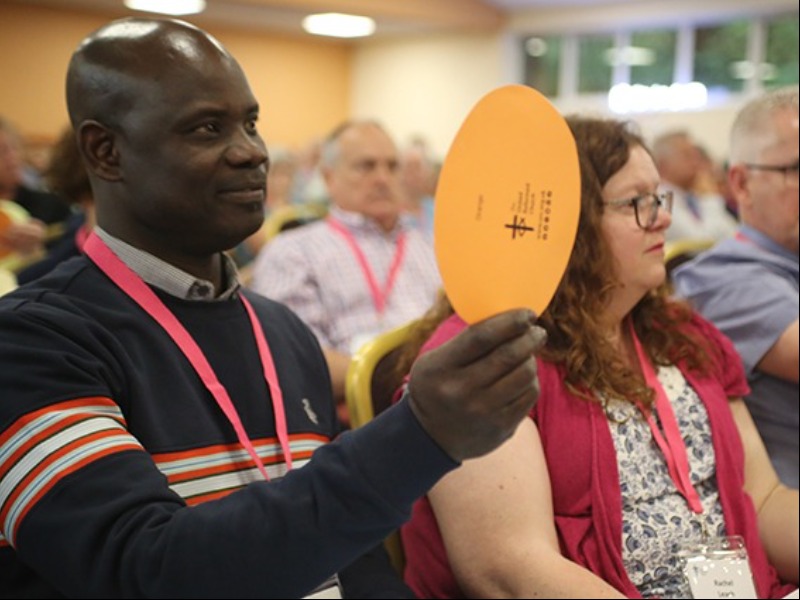Day two of the United Reformed Church 2023 General Assembly started with worship and a Bible study led by Dr Nicola Brady, General Secretary of Churches Together in Britain and Ireland.
Dr Brady began with the story of Zacchaeus in Luke 19. She talked about how in her own Church, the Roman Catholic Church, the Pope was calling them to rediscover synodality – wider involvement in decision-making, especially bringing in those people who are now on the margins of the Church. ‘We have nothing like this General Assembly,’ she said, ‘but are hoping to build something.’
They were also called to renew their ecumenical commitment, Dr Brady said. The Church is at an early stage of thinking about how to invite people to take part in these processes.
Considering the Bible passage, Dr Brady said it involved a journey, such as the Church is on now. It involved an outsider, Zacchaeus, invited by Jesus to join the disciples; but it also involved Zacchaeus being asked to open his own doors to Jesus.
Dr Brady invited members of Assembly to imagine themselves in Zacchaeus’s place – called by Christ, not to lose ourselves in pressure of work, but to consider Christ’s demands on us.
She invited members also to imagine themselves as the crowd traveling with Jesus, as he called Zacchaeus to join them. She reflected on the limitations of a message of welcome in the Church, when those who are already in it are not fully included. ‘We need to move from a message of welcome to true belonging,’ she said, ‘where people are allowed and facilitated to take responsibility.’
Dr Brady concluded by invited members of Assembly to consider four questions: Who is in the tree for us to reach? How can we invite them? What can we offer them? What do we ask of them?
The Revd Nigel Uden, former General Assembly Moderator 2018-2020, then introduced the two candidates for General Assembly Moderator 2024-25. They were the Revd Martha McInnes, currently ministering in Wales Synod, and the Revd Tim Meadows, currently ministering in Mersey Synod.
Both candidates spoke of what they would bring to the role, and both responded to a question put to them by Mr Uden: “In a conciliar Church, what is your understanding of personal leadership and what things might characterise your leadership?”
Following a time of prayer, a listening exercise was then carried out to where God may be pointing Assembly in the appointment for its next Moderator. It was later announced that the Revd Tim Meadows was duly elected General Assembly Moderator-Elect 2023-2024.
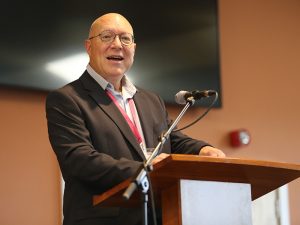
Session three
The Moderator then introduced URC Treasure, snippets of resources from around the denomination that different people from different parts of the URC can draw on.
Dr Sam Richards, Head of Children’s and Youth introduced URC Treasure: Faith Adventures for Children Together (FACT) – a new, free, weekly resource for churches to support children aged from 0-12 years old. The resource is based on six principles: it’s Bible-based, creative and playful, inclusive and accessible, enables curiosity and provides challenge, fosters a God connection and children’s spirituality, and is URC distinct, embodying the values in the way URC works with children.
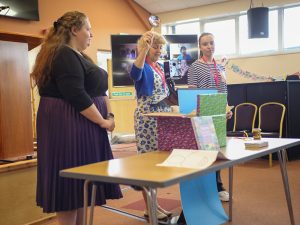
FACT can be adapted to local contexts and contains ideas for planning and engaging with the Bible through readings, stories, prayers, activities and much more. Learn more about FACT.
Paper H5 Ministries Committee: Withdrawal of call
At present, the call of a Minister of Word and Sacraments or a Church Related Community Worker (CRCW) can be withdrawn as a result of a disciplinary, incapacity or capability process. However, there are times when a breakdown of a pastoral relationship may lead to a withdrawal of call.
The paper and resolution from the Ministries Committee outlined the roles of the Councils of the Church, including Local Ecumenical Partnership settings, in the withdrawal of Call process as well as information about manse provisions, expenses and stipend.
Ministers move on, the report said: Ministers accept new calls, retire, resign for work outside the ministry of the URC, a post might be time-limited or a minister wishes to leave because of a breakdown in relationship with colleagues, Elders, or significant people within a church, project or post.
On occasions, a breakdown might be because of intractable difficulties which aren’t related to capability or discipline such as a complaint under Section Q of The Manual or might simply be as a result of a sense that this ministry has gone on for too long.
In most cases, the Elders (or LEP equivalent) and Synod Moderator should meet.
As it is the local church or pastorate that issues a call, with which the Synod concurs, the same councils of the Church need to be involved in the process for a call to be withdrawn.
Once ministerial service ceases, so does the provision of a manse, and the policy sets out the notice period for that and for the stipend to continue, both of which are three months, with already existing provisions for additional support available if needed.
“It is hoped that this occurrence is rare, but this policy is brought before you to help when these situations arise,” Mary Thomas concluded.
After several comments from the floor, paragraphs 4.10 and 4.11 were withdrawn from the policy by the Ministries Committee.
Stephen Newell supported the policy and urged careful communication because, in essence, a breakdown between a church and its minister is a divorce.
Jonnie Hill asked if provisions might be put in place in case anyone used the policy in a vexatious way.
Martyn Coe wondered if unrealistic expectations by churches had been a factor in the thinking of the policy.
John Bradbury encouraged Assembly to accept the policy in the knowledge that it always evolves and could be fine-tuned after General Assembly, to avoid policy being drafted from the floor. The lack of a policy puts many people in a vulnerable place and open to legal challenge.
Nigel Uden proposed an amendment to instruct the Ministries Committee to bring a revised policy back at the next General Assembly. This was accepted.
Assembly adopted the policy with a request from the Moderator for those with concerns to contact Ministries.
Session four
Paper C1 Communications Strategy
Paper C1 was presented by the Revd Peter Stevenson, Convenor of the Communications Committee, supported by Andy Jackson, Head of Communications.
Peter began by showing well-known logos, the brand and value of which can be easily identified to make the point that those logos convey an impression and that the resolutions seek to develop and present an impression of the URC attached to its brand and logo.
After Assembly returned from buzz groups where it explored points outlined in the paper, Peter explained the purpose of Resolutions 14-19, that much of communication is about creating a good first impression and sustaining the thought in people’s mind that whenever they come into contact with an organisation, they know that they can trust the information about it to be true, appropriate and accurate.
For instance, a kite mark confirms that a product or service’s claim has been independently and repeatedly tested by experts, meaning that people can have trust and confidence in the products and services that are BSI Kitemark certified.
Peter explained that the principle of seeing a logo and associating it with meaning is what the strategy seeks to replicate. When people see the URC logo, the aim is to create a sense of trust and an expectation of quality and value.
Papers C1-C5 outlines the work that has been done over the past few years and the direction that the committee and team believe will streamline, enhance, and add value to the image and impression of the United Reformed Church.
Paper C1 provides an update on the team and its work. Paper C2 focuses on the department’s strategy, in particular a strategic focus to deliver the team’s mandate of providing effective communication and celebration of the Gospel in and beyond the URC by giving voice to good news, facilitating regional and national communications, supporting the communications of Church House departments and General Assembly, and resourcing local churches. Paper C3 provides further reflections and initiatives. Paper C4 provides objectives of the URC Bookshop procurement policy, the purchase of works, goods, and services according to an open and transparent process, and Paper C5 explains why a digital visual identity for the URC is important and provides examples of the work so far in this regard.
Assembly first discussed Resolution 14. During the clarification stage points made from the floor centred on how, having undertaken a research project, will the data be kept updated and refreshed? It was explained that the hope is that the network and the URC database will help in this regard. It was further asked that that would be fine in regard to keeping contacts up-to-date but may not be the case in regards to church profiles?
During the discussion stage – concerns from the floor centred on getting the people required to fulfil the roles outlined as needed in the paper, e.g. media-savy people, how would the strategy work in regard to branding LEPs. The logo was described as colour-intensive, so printing things can be expensive for local congregations. It was asked if variations of less colour-intensive versions of the logo could be produced?
Peter responded that in regard to LEPs, materials can be adapted to suit the congregation, but the material needs to be there in the first place. Andy further clarified that the committee is mindful of colour intensity and the issues that can be presented, but that work is already undertaken within the Graphics department to address this.
In regard to resolution 16 – Andy explained that either a website or some sort of digital presence e.g a Facebook page, is essential in modern society and that the ideal is for every church to have a digital presence. He went on to explain that iChurch is a person-centred resource and offers support throughout the process of building and maintaining a website.
A member of youth representative shared how they were encouraged by the strategy and how important it is for all levels of the Church, in particular local congregations to engage with. Another, who studies media at school, offered great advice explaining how young people more use social media than websites, and that this method could be a means to encourage more young people to Church.
In relation to Resolution 17, concerns centred on consistent branding and how that might be misleading branding, another, although supporting the resolutions queried where funding for the strategy would come from, and a further query centred on whether URC Youth be expected to use this or would they be able to use their own digital identity.
Andy explained that more money is not being sought, the Communications has already budget, and congregations can fund new notice boards or seek additional support from Synods. URC Youth was encouraged to continue doing what they do. Peter further explained that the branding is not misleading but that it and the paper shows that the committee is doing its best.
Resolutions 14-19 were all carried.
Community Awards
This year marks the 25th year of the URC’s community project awards. The awards are given at each General Assembly to celebrate innovative and transformative work that United Reformed Churches do in their communities.
Since 1998, 66 projects have won awards with prizes totalling £125,000. The scheme was founded by the Revd David Lawrence, and for the past 14 years has been sponsored by Congregational.
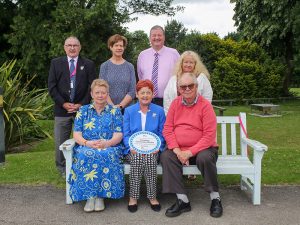
The Revd Fiona Bennett, Moderator of Assembly, paid tribute to Margaret Slater of Congregational, who is retiring after 14 years of overseeing the awards. Her place was taken by Martin Cox, CEO of Integra Insurance Solutions, the parent company of Congregational. He said the work recognised by the awards is ‘truly inspirational’ and thanked United Reformed churches for all that they do.
Three projects won awards at this year’s Assembly:
- Causeway Community Garden, at St Johns United Reformed Church, Warrington, Cheshire, a garden that offers space for the community to enjoy and to support mental health;
- Darwen Asylum Refugee Enterprise, at Central United Reformed Church, Darwen, Lancashire, a drop-in service for the local refugee and asylum seeker community;
- Wooler Warm Welcome, at Wooler United Reformed Church, Northumberland, a warm, safe and comfortable place for people to meet informally.
Reports on all projects will be published in Reform in the coming months.
Session five
Paper N1/N2a Church Life Review to follow.
Session six
Session six began with another URC Treasure, the Joint Public Issues Team (JPIT).
Simeon Mitchell, Secretary of Church and Society who also serves as Team Leader of JPIT, gave prizes to members of Assembly who could say what the acronym JPIT meant, who the partners of the scheme were and what the team stood for – justice and peace.
JPIT works on behalf of The Baptist Union of Great Britain, the Methodist Church in Great Britain and the URC. The Church of Scotland is also an associate partner of the team. Simeon explained that JPIT is about standing up to injustice and working for justice and peace through listening, learning, praying and speaking and acting on public policy issues.
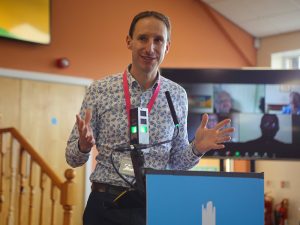
Simeon explained how the issues are many and various, but has a focus on six in particular: poverty, refugees, the environment, the economy, peacemaking, and influencing policy.
Part of JPIT’s work is about being a voice in the “public square” and resourcing churches to respond to social justice issues. JPIT provides opportunities to think about these issues through a faith lens and provides resources such as “Just economics” a small-group course; helps churches to express concerns and contribute to the thinking of policy decision-makers, e.g responding to the illegal migration bill where JPIT issued a statement through church leader, attracting 1,500 signatories in the process, which was delivered to Downing Street in April. The team also helps promote engagement by sharing the message that engaging with politics is central to faith work helping Christians to be well-informed about issues achieved by resources such as JPIT’s podcast Politics in the Pulpit? For all JPIT news and to access its free resources, visit www.jpit.uk.
Greetings from ecumenical and international guests
Karen Campbell, Secretary for Global and Intercultural Relations, welcomed international partners including those joining by Zoom, some of whom were juggling two time zones.
Partners from Taiwan and Korea were weclomed as well as Najla Kassab, President of the World Council of Reformed Churches, who spoke at the URC Ministers’ Gathering last year, and Gordon Cowans, former Moderator of the United Church Jamaica and the Cayman Islands (UCJCI), and the current Chair of its Reparations Task Group.
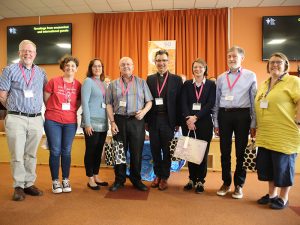
Fiona Bennett, Moderator, added to Karen’s welcome: “You being part of our Assembly makes us more whole. We appreciate all that you share with us.”
Gordon Cowans responded saying: “I was shown the creative journey of [the URC’s] apology from 2022 which, as a deeply significant document, rose from the level of important to breathtakingly comforting. We honour your courage and moral conviction, because it matters to us and to God. There is no telling what may be accomplished by the hand of God as we draw closer together to actions for justice. May God grant you grace in all that you continue to do in your inspiring assembly.”
Philip Brooks, Deputy General Secretary (Mission) also welcomed ecumenical and international guests, and invited the Dr Anna Krauss, General Secretary of the Council of Lutheran Churches in Great Britain, and the new President of Churches Together in England, representing the Fourth Presidency Group, to address the Assembly.
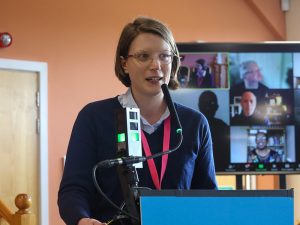
“It’s very exciting for me to be deliberating with you, because I am a resident here but am not a citizen. This is the first time I’ve been allowed to vote in this country – thanks for the trust in ecumenical relations! As a Lutheran, it’s a special year to be here as this is the 50th year of the Leuenberg Concord [where churches are allowed to be different because they appeal to the Gospel as their common basis].
“I have just started my term as the Fourth President in CTE, which went through a difficult period with my predecessor. I want to profoundly thank you for supporting the Fourth Presidency group, with good wishes for standing together with us.
“We are committed to journeying together ecumenically. I’m thankful for all churches to stay with us and to work together with us on these issues. I don’t want to forget about the empty chair.
“You discuss many things very deeply as a church built on ecumenism, and you are an example of being ecumenical in your DNA. I’m thankful to be able to listen, to learn and to exchange experiences. May God bless this assembly and the work of the assembly.”
Paper I3 – Mission Committee: Legacies of Slavery, proposals for repairing justice
General Assembly has agreed to give anti-racism training to Church office-holders, including all ministers in the United Reformed Church. This follows from the confession and apology that Assembly passed in 2022 concerning transatlantic slavery and its continuing legacies.
Sarah Lane Cawte, convenor of the Mission Committee, presented the proposals, thanking Legacies of Slavery Task Group for ‘its diligent, detailed and courageous work’.
Karen Campbell, Secretary for Global and Intercultural Ministries, asked Assembly to think of the Church’s commitment to anti-racism as a journey. The URC needs to get its own house in order, she said, if it is to speak with credibility into the wider world.
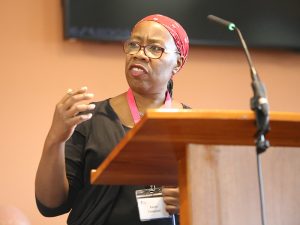
Ms Campbell acknowledged that some people would shy away from introducing mandatory training, as these proposals do. But, she said, the URC’s long history of unfulfilled good intentions on racial justice means that it cannot be left up to individuals to take it or leave it.
She assured members that training would not require white people to apologise for being white. It will be run by Professor Anthony Reddie who is an expert and approaches racism from a specifically Christian standpoint. His training, she said, establishes ‘a safe environment to enable personal and group reflection without shying away from difficult conversations’.
The Convenor of the Legacies of Slavery Task Group, Professor David Reynolds, underlined the fact that the proposals included future plans for a network of pioneers in cities that became prosperous through the slave trade, and engaging with CWM partners.
Assembly responded very enthusiastically to the proposals, and the main area of discussion was about taking them further. Some wanted the training to be given to every member of the URC. Some were concerned that the Church needs to give future training to new officers not just one blast. Ms Lane Cawte said that the URC would not be able to offer sessions with Professor Reddie in perpetuity, but that his training would be a starting point that the URC could build on in the future.
Answering questions from members, the task group clarified several points. The course is fully prepared but will start in January. It lasts one full day, in person not online. It covers racism in general, not any one race in particular. The figure of £20,000 quoted in the proposals is only to cover the training between January and the General Assembly in July, when further costs will be considered.
Assembly considered the question of discipline for anyone who might refuse training and was assured that appropriate disciplinary patterns exist already.
All six resolutions in connection with this paper were carried unanimously.
Paper I2 – Mission Committee: Poverty and Inequality in the URC
Sarah Lane-Cawte, Convenor of the Mission Committee, supported by Simeon Mitchell, Secretary for Church and Society, introduced Paper I2 by inviting Assembly to listen to a short series of audio recordings of people talking about their experiences of poverty in recent months, produced by the Changing Realities project, a collaboration between the University of York and the Child Poverty Action Group.
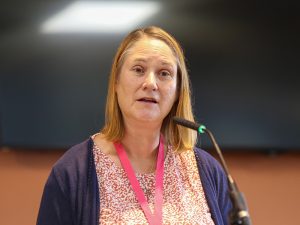
Simeon explained how the recordings depict the struggles people have experienced, particularly during the cost-of-living crisis, illustrating how “people simply don’t have anything to fall back on”.
He outlined how around half of adults in receipt of Universal Credit report that they regularly skip meals because they cannot afford them and how child poverty levels are at record levels.
“This latest crisis comes against the backdrop of a decade in which poverty in the UK has got deeper and more persistent,” he said. “Foodbanks, little known 15 years ago, are now a central part of the welfare support system.”
He added that although it was right for churches to be involved with foodbanks and other practical ways of providing help, and though that help was vital, he quoted Desmond Tutu who famously said: “There comes a point where we need to stop just pulling people out of the river. We need to go upstream and find out why they’re falling in.”
Simeon also reiterated how Jesus came to give news to the poor and how the resolution sought to do just that.
Resolution 31 calls on General Assembly to challenge poverty and the structures that cause marginalisation by recognising that poverty is a result of political choices and systemic injustices; calling on political leaders to make commitments towards the eradication of structural poverty in the UK; and asking the Mission and Ministries committees to reflect on the ways in which the Church might be able to demonstrate its commitment to people living in poverty through the allocating of resources for ministry and mission, and to bring any such proposals to a future General Assembly.
Representatives of Youth Assembly shared how section c of the report echoed the sentiment of Youth Assembly’s resolution, passed at its meeting earlier this year, which encouraged to churches to share resources, particularly challenging those with more financial resources to do more to communities on the margin.
Concerns from the floor, although supporting the essence of the paper, centred around it lacking action, others asked why the word structural made the resolution stronger instead of just focusing on the eradication of poverty. Simeon addressed these points, explaining that the word “structural” was used deliberately because some people found themselves in accidental circumstances of poverty, i.e. systemic reasons. Simeon also acknowledged that the paper doesn’t say all that could be said about poverty in the UK, but seeks in spirit to address the main issues.
Amendments were proposed to part b of the resolution, to reflect the stigmatisation and discrimination that is often shown to people living in poverty.
Following a lively debate the amendment to the resolution was carried, and then the resolution itself passed with full support.
Paper X2 – yoURChurch
General Assembly made the online meeting yoURChurch a congregation of the URC. yoURChurch began meeting during the first lockdown in 2020, and has continued ever since.
The Revd Fran Kissack introduced the proposals to Assembly, saying that yoURChurch was a welcoming space, a safe space, a challenging space, an honest space, a diverse space and ‘a space to make a Jesus-shaped difference.’
Assembly heard feedback from worshippers about how yoURChurch meets needs other churches don’t. ‘It is literally a godsend,’ said one.
In response to questions from members of Assembly, it was explained that yoURChurch would be considered a local church, despite being online, because that was in line with URC polity, and that it would be part of North Western Synod. Membership would work as it does in other local churches; earlier questions of membership had been resolved but the URC would continue to look at whether greater flexibility was possible.
Ms Kissack said that yoURChurch celebrated communion on Zoom – they had thought it would be weird but in fact found it “a deep and meaningful experience”. They would not attempt baptism or ordination online though.
Martin Henninger, a guest from the Church of the Palatinate in Germany, said that yoURChurch had maintained links between Palatinate and URC during the pandemic.
Day two of General Assembly closed with evening prayer and a reflection on “a space of grace is a space of journeying and growth”.
Reporting team: Andy Jackson, Ann-Marie Nye, Stephen Tomkins, and Laurence Wareing. Pictures by Chris Andrews.

